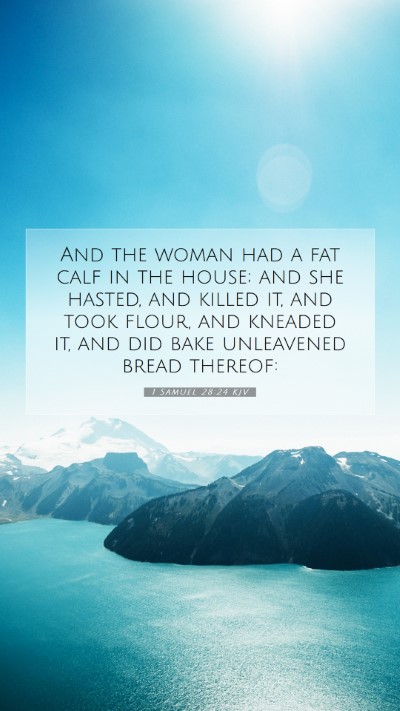Bible Verse Commentary: 1 Samuel 28:24
In 1 Samuel 28:24, we encounter a dramatic narrative during a pivotal moment in the life of King Saul. The verse reads:
"And the woman had a fat calf in the house; and she hasted, and killed it, and took flour, and kneaded it, and did bake unleavened bread thereof."
This brief description reveals significant layers of meaning and provides us insights into the context and implications of this event.
Summary of Verse Meaning
The act of the woman killing a fat calf and preparing unleavened bread illustrates her readiness to serve Saul, highlighting both her hospitality and the gravity of the situation. This verse encapsulates themes of desperation, fear, and the lengths to which people may go in dire circumstances. Below, we explore interpretations of this passage through various commentaries.
Key Insights from Commentaries
-
Matthew Henry:
Henry emphasizes the nature of the woman’s response, noting her readiness to prepare a meal for Saul, which signifies her understanding of the need to honor someone in a precarious situation. It suggests a mix of fear and reverence, as she serves a king who is seeking divine counsel through questionable means.
-
Albert Barnes:
Barnes highlights the irony present in this account. Despite Saul’s role as the anointed king of Israel, at this point, he is desperately seeking guidance from a medium, indicating a significant spiritual decline. The act of preparing food can be seen as an act of desperation, reflecting the tumultuous state of Saul’s kingdom and his own spiritual vacuum.
-
Adam Clarke:
Clarke offers a historical and cultural analysis of the passage, noting that unleavened bread is often associated with haste and the urgency of the moment. The preparation of such food aligns with the narrative of anxious uncertainty as Saul seeks answers about his fate and the fate of Israel. Clarke’s insights point to the gravity of the incident within the broader socio-political landscape of Israel at that time.
Theological Implications
The incident also raises significant theological questions about Saul's relationship with God and what it means to seek guidance outside of established channels. This contemplation of the verse leads to deeper bible verse interpretations regarding divine authority and the consequences of turning away from God.
Application to Daily Life
The actions of the woman and Saul in this verse can be referenced in bible study groups and discussions about the appropriate ways to seek guidance in crises. Reflecting on understanding Scripture in this context can provide valuable insights into the integrity and source of the counsel we seek during our own troubled times.
Related Bible Cross References
- 1 Samuel 28:6: Saul seeks counsel from the Lord, but God does not answer.
- 1 Samuel 15:26: God's rejection of Saul as king is significant to understanding Saul's desperation.
- 2 Chronicles 33:6: The use of mediums and the consequences as seen in Manasseh's reign.
In-Depth Study Opportunities
Engaging in online Bible study delving into the historical context and narrative analysis surrounding this verse aids in appreciating the weight of Saul's actions. This serves as a reminder of the significance of aligning our choices with God’s will and seeking counsel in the right places.
Conclusion
In conclusion, 1 Samuel 28:24 is not simply a fleeting moment in Saul's life; it acts as a pivotal point for reflecting on broader themes in Scripture, such as authority, the search for wisdom, and the consequences of abandoning faith. Engaging with the meaning of Bible verses such as this provides vital opportunities for spiritual growth and understanding.


